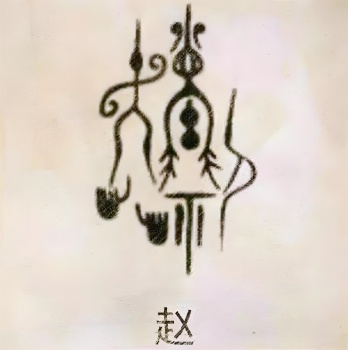The Zhao (zhào) surname is one of the most common surnames in northern China, with roots tracing back to ancient times. It carries profound historical and cultural significance, leaving a lasting impact on Chinese politics, military, and culture. Below is a simplified overview of its origin, development, and cultural connotations, tailored for American readers interested in Chinese history and heritage.

1. The Legendary Beginning: Zhao Fu and the Birth of the Zhao Surname
The Zhao surname can be traced back to the ancient era, with its mainstream origin linked to the Ying (嬴) family. The founding ancestor of the Zhao clan, Zhao Fu, was a descendant of Shao Hao, a legendary emperor in Chinese mythology. Zhao Fu was renowned for his exceptional skill in charioteering, which earned him the favor of King Mu of the Zhou Dynasty.
Legend has it that Zhao Fu presented eight magnificent horses to King Mu, aiding him in his western expeditions. When a rebellion led by Xu Yanwang broke out, Zhao Fu drove the king’s chariot over a thousand miles in a single day to help suppress the uprising. For his contributions, King Mu granted Zhao Fu the city of Zhao (modern-day Zhaocheng Town in Shanxi Province) as his fief. Zhao Fu’s descendants then adopted “Zhao” as their surname, marking the beginning of the Zhao lineage.
The name “Zhao” symbolizes speed and ambition, reflecting the family’s drive for progress. Additionally, the Zhao surname has diverse origins, including minority groups adopting the name and imperial bestowals, such as the Xiongnu leader Zhao Anji and the Nanman leader Zhao Yefu, showcasing China’s history of ethnic integration.
2. Historical Development: From Powerful Ministers to Imperial Surname
The Zhao surname’s evolution is deeply intertwined with China’s political history, spanning several key periods:
Spring and Autumn and Warring States Periods**: Zhao Fu’s seventh-generation descendant, Zhao Shudai, moved to the state of Jin, where the Zhao family became one of the six powerful ministerial clans. Figures like Zhao Jianzi and Zhao Xiangzi played pivotal roles in the division of Jin, leading to the establishment of the state of Zhao, one of the seven major powers during the Warring States period. King Wuling of Zhao’s military reforms, including the adoption of nomadic cavalry tactics, significantly strengthened the state.
Qin to Tang Dynasties: After the fall of Zhao, its descendants migrated to regions like Tianshui in Gansu and Fang County in Hubei. Zhao Tuo established the Nanyue Kingdom, spreading Central Plains culture to southern China. During the Northern Wei Dynasty, the Tianshui Zhao branch moved to Luoyang and Wuchuan, becoming a key part of the Guanlong Group.
Song to Qing Dynasties: Zhao Kuangyin founded the Song Dynasty, making Zhao the imperial surname. The royal family’s members spread across the country. During the Southern Song Dynasty, the Zhao surname migrated south to Jiangsu and Zhejiang. In the Yuan, Ming, and Qing dynasties, ethnic groups like the Mongols and Manchus adopted the Zhao surname, further expanding its reach.
3. Cultural Significance: Hall Names, Family Precepts, and Spiritual Heritage
The Zhao surname is rich in cultural symbolism, reflected in the following aspects:
Hall Names and Ancestral Homes: The Zhao family is associated with hall names like “Tianshui Hall,” “Qinhe Hall,” and “Banbu Hall.” “Qinhe Hall” honors Zhao Bian, a Song Dynasty official known for his integrity, symbolized by his companionship with a qin (a musical instrument) and a crane. “Banbu Hall” references Zhao Pu, a Song prime minister who famously claimed that half of the Analects of Confucius was sufficient to govern the world. Prominent ancestral homes include Tianshui (Gansu), Zhuojun (Hebei), and Nanyang (Henan).
Family Precepts: The Zhao family emphasizes values like integrity, diligence, and frugality. Their precepts include prohibitions against forming alliances, selling ancestral land, infighting, and desecrating ancestral graves, reflecting Confucian ethics and a strong sense of familial responsibility.
Ancestral Symbols: The “First Zhao Ancestral Hall” in Zhaocheng, Shanxi, and the Zhao Fu Pagoda serve as global pilgrimage sites for Zhao descendants, symbolizing the continuity of bloodlines and cultural heritage.
4. Historical Figures: A Legacy of Excellence
The Zhao surname boasts a long list of notable figures:
Politicians: Zhao Pu (founding prime minister of the Song Dynasty) and Zhao Kuangyin (Emperor Taizu of Song, known for consolidating power through diplomatic means).
Military Leaders: King Wuling of Zhao (military reformer) and Zhao Yun (a renowned general from the Three Kingdoms period, famously known as “Zhao Zilong of Changshan”).
Cultural Icons: Zhao Mengfu (a Yuan Dynasty master of calligraphy and painting, creator of the “Zhao Style”) and Emperor Huizong of Song (a highly accomplished artist).
Scientific Pioneers: Zhao Jiuzhang (a modern geophysicist and pioneer in China’s satellite program).
5. Modern Distribution: A Global Family
With approximately 28.6 million bearers, the Zhao surname ranks eighth in China and holds the top position in the traditional Hundred Family Surnames (due to its imperial status during the Song Dynasty). The surname is concentrated in the Yellow River Basin, with Henan, Shandong, and Hebei provinces accounting for 36% of the Zhao population. Significant communities also exist in Heilongjiang, Jiangsu, and Sichuan. Overseas, Zhao descendants are found across Southeast Asia, Europe, and the Americas, continuing the family’s cultural legacy.
Conclusion
The Zhao surname is not just a symbol of Chinese surname culture but also a microcosm of Chinese history. From the legendary tales of Zhao Fu to the rise of the Zhao state, from the cultural achievements of the Song Dynasty to the global expansion of the Zhao family, the surname has always resonated with the nation’s destiny. It embodies values like integrity, diligence, and a sense of duty, serving as a testament to the enduring spirit of Chinese civilization.